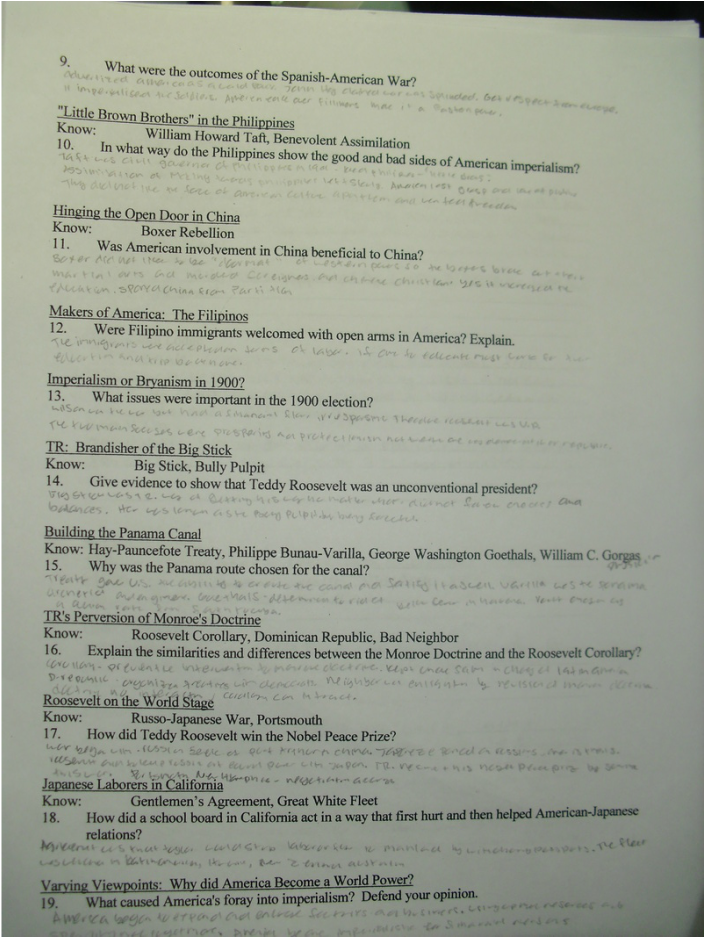

Battle of Chateau-Thierry The first significant engagement of American troops in World War I-and, indeed, in any European war. Units of the _ fought at Cantigny in May and at Chateau Thierry and Belleau Wood in June its major engagements were at Saint Mihiel (September 12-15) and the Meuse-Argonne (September 26-November 11. Because the United States entered the war so late, by the time the _ was raised, trained, and deployed, the war was in its last year (1918). Pershing and composed mostly of conscripts. Army force deployed to Europe in World War I commanded by General John J. American Expeditionary Forces (AEF) The name given to the U.S.

Sheppard-Towner Maternity Act Designed to appeal to new women voters, this act provided federally financed instruction in maternal and infant health care and expanded the role of government in family welfare.

Nineteenth Amendment This constitutional amendment, finally passed by Congress in 1919 and ratified in 1920, gave women the right to vote over seventy years after the first organized calls for woman's suffrage in Seneca Falls, New York. After 1970, increasing numbers of African Americans trekked back to the South in what was called the New _ _, as new jobs became more plentiful in the South than in the older industrial cities of the North and racial relations improved in the South. From 1940 to 1970, another 5 million left the South, pushed off the land by the mechanization of cotton farming and lured north and west by hopes for greater economic opportunity and more equitable political participation. The first, from World War I until the onset of the Great Depression, brought more than 1.5 million migrants to northern cities. Great Migration The movement of 6 million African Americans from the rural South to the urban North and West in two major waves. The _ particularly appealed to migratory workers in agriculture and lumbering and to miners, all of whom suffered from horrific working conditions. At its peak in 1923, it could claim 100,000 members and could gain the support of 300,000. Industrial Workers of the World The _, also known as the "Wobblies," was a radical organization that sought to build "one big union" and advocated industrial sabotage in defense of that goal. Under the economic mobilization of the _ _ _, industrial production in the United States increased 20 percent during the war. War Industries Board Headed by Bernard Baruch, this federal agency coordinated industrial production during World War I, setting production quotas, allocating raw materials, and pushing companies to increase efficiency and eliminate waste. United States A Supreme Court decision that upheld the Espionage and Sedition Acts, reasoning that freedom of speech could be curtailed when it posed a "clear and present danger" to the nation. It regularly distributed prowar propaganda and sent out an army of "four-minute men" to rally crowds and deliver "patriotic pep." Espionage Act A law prohibiting interference with the draft and other acts of national "disloyalty." Together with the Sedition Act of 1918, which added penalties for abusing the government in writing, it created a climate that was unfriendly to civil liberties. Committee on Public Information A government office during World War I known popularly as the Creel Committee for its chairman George Creel, it was dedicated to winning everyday Americans' support for the war effort. Fourteen Points Woodrow Wilson's proposal to ensure peace after World War I, calling for an end to secret treaties, widespread arms reduction, national self-determination, and a new league of nations. When the note was intercepted and published in March 1917, it caused an uproar that made some Americans more willing to enter the war. Zimmermann Note German foreign secretary Arthur _ had secretly proposed a German-Mexican alliance against the United States.

It ended the lives of 1,198 people, including 128 Americans, and pushed the United States closer to war. Lusitania British passenger liner that sank after it was torpedoed by Germany on May 7, 1915. _-_ attacks played an important role in drawing the United States into the First World War. U-Boats German submarines, named for the German Unterseeboot, or "undersea boat," proved deadly for Allied ships in the war zone. Allies Great Britain, Russia, and France, later joined by Italy, Japan, and the United States, formed this alliance against the Central Powers in World War I.


 0 kommentar(er)
0 kommentar(er)
